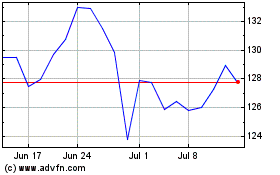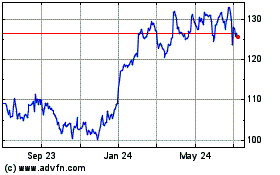Merck Says Keytruda Liver Cancer Study Meets Objective
September 27 2021 - 8:11AM
Dow Jones News
By Michael Dabaie
Merck & Co. Inc. said the Phase 3 Keynote-394 trial
investigating Keytruda in Asian patients with advanced
hepatocellular carcinoma, a form of liver cancer, met its primary
objective of overall survival.
Hepatocellular carcinoma is the most common form of primary
liver cancer, which is the sixth most frequently diagnosed cancer
worldwide. Keynote-394 looked at patients previously treated with
sorafenib.
The study found that treatment with Keytruda plus best
supportive care resulted in a statistically significant improvement
in overall survival compared with placebo plus best supportive
care. The study also met its key secondary endpoints of
progression-free survival and objective response rate, with
statistically significant improvements for Keytruda compared with
placebo.
"Frequently diagnosed at an advanced stage, hepatocellular
carcinoma has one of the highest mortality rates of solid cancers.
Despite recent progress, there remains an unmet need for anti-PD-1
monotherapy after sorafenib, where Keytruda is an established
treatment option for patients," said Dr. Scot Ebbinghaus, vice
president of clinical research for Merck Research Laboratories.
Keytruda was granted accelerated approval in November 2018 for
the treatment of patients with HCC who have been previously treated
with sorafenib, based on ORR and durability of response data from
the Keynote-224 study. A subsequent study, Keynote-240, didn't meet
its dual primary endpoints of OS and PFS.
Write to Michael Dabaie at michael.dabaie@wsj.com
(END) Dow Jones Newswires
September 27, 2021 07:56 ET (11:56 GMT)
Copyright (c) 2021 Dow Jones & Company, Inc.
Merck (NYSE:MRK)
Historical Stock Chart
From Mar 2024 to Apr 2024

Merck (NYSE:MRK)
Historical Stock Chart
From Apr 2023 to Apr 2024
